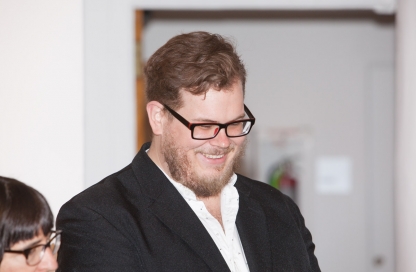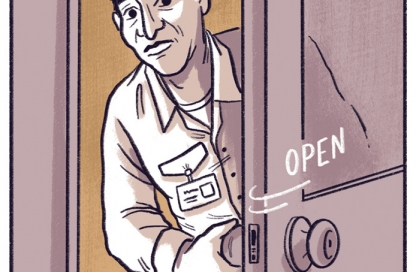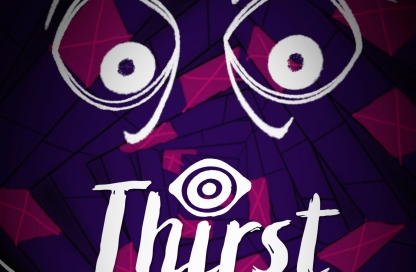Interview with Ana Lozada, creator of ‘Failed State’
Ana Lozada (MFA Visual Narrative, Class of 2019) is a Venezuelan illustrator, designer and visual storyteller originally based in Osaka. Due to her diverse international experience, her influences range from European expressionist artists to Japanese animators such as Masaaki Yuasa. During her years at Osaka Communication Arts College, she was awarded the 2014 Grand Prize for the Asahi Newspaper student advertising Contest by Osaka Copywriter’s club. Since then she’s worked in various video-game projects and her work has been included in Latin American Illustration 7’s online collection.
Ana’s mentor is Rose Wong.
Tell us something about your thesis story. What’s the title, and what’s it about?
My thesis project is titled Failed State. Failed State is a story about making changes in society and speaking freely with your personal voice, and how difficult that is in a practical and emotional sense. It is told through the journal of an upper-middle class Venezuelan girl living through her country’s slow but steady infrastructural decay, a period roughly between 1989 to modern day.
It’s fascinating to observe students decide on the subject for their thesis project. Why do you feel like Failed State is the story you chose?
I knew that I wanted to make a story that is representative of Venezuela and Venezuelan people’s experiences since the start of the program, since there are hardly any stories out there about us that feel human. Failed State’s plot line is the result of trying to narrow down which of these experiences are both important for people outside Venezuela to know, and also deliver a relatable message. I felt that a girl’s inner struggle to accept her strengths and use them to influence her world is a very common human experience that would allow the reader to understand conflicts and situations particular to Venezuelans, even if they have very little knowledge of Venezuela’s issues.

I can only speak with any confidence about sensibilities of citizens of the U.S. We’re going through a time where everything is either/or. Good or evil. It’s in our politics and more a part of our social fabric than at any time in recent memory. Do you see Venezuela’s problems as a two-sided affair? Or is it more complex than that?
This is something that has changed drastically over the years and it’s very difficult to summarize, but I would say there is a division. However, it isn’t driven by political ideology or class, there are only governments against citizens.
The US seems to be divided primarily by class in recent years, whereas when Chavez got elected, people from all social classes voted for him. Despite this, almost everyone was willing to oppose him just as quickly out of fear that he would turn Venezuela into a lager version of Cuba, resulting in a rather large though failed coup d’état in 2002.
Since then, a ‘nationalist’ vs ‘imperialist’ narrative has been crafted by the government, the ‘imperialists’ being people who ended up opposing Chavez and now Maduro and they’ve been labeled as such for apparently promoting US imperialism over a Venezuelan nationalist sentiment. However, I see the division as something simpler than that, there’s the people profiting from the way the government is run, which includes the party that opposes Maduro as well since they use his deeds as a way to leverage themselves rather than really find solutions to our current problems and the citizens. People in Venezuela don’t have access to food or medicine. Wages are extremely low. There’s no freedom of speech due to the government controlling the military. And, in a lot of cases, we don’t even have access to documents for us to leave and be accepted as refugees in foreign countries. Foreign governments deny Venezuelans legal entry and stay and profit from extremely cheap and possibly illegal labor. Venezuelans that have left take on these unfair circumstances because they’re just that desperate.

There are no Republicans or Democrats, rich vs poor or even “nationalists” vs “imperialists”. There’s only a massive number of unrepresented people trying to survive and the governments trying to profit off of their despair.
Without giving too much away, will you story have a strong point of view by the end? In other words, will we be clear about how you feel about the situation as the storyteller? Or do you hope to disappear from the story as much as possible?
This story is written from the point of view of a character that is supposed to be representative of my own, my mother’s and my sister’s experiences. I’m also working with collaborators that have a background in economics and a mentor who is unfamiliar with the situation in Venezuela in order to get feedback on what kinds of things need to be explained to a foreign audience. I think it will definitely have a strong point of view by the end and I certainly won’t disappear from it, but it’s not a strictly autobiographical story. It will take a foreign target audience into account, so I hope the end product will deliver a broader view of the situation than just my own.![]()
Ana, this story project sounds amazing! Last question. What would you like to do with your thesis story after you graduate in 2019?
Thanks Ben!
I’ll print and sell it myself, but ideally, I want to find a publisher willing to distribute the book. I hope that as many people as possible have a chance to read this story and get to understand the Venezuelan experience on an emotional level.
Thanks for talking to us Ana.
If you’d like to stay up to date on Ana’s project, follow her on Instagram and Behance
You can also follow us on Facebook, Instagram and Twitter.



